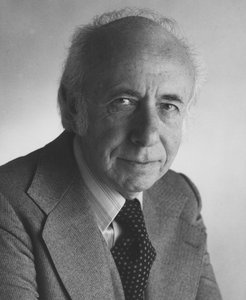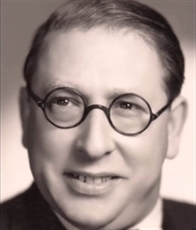Related Research Articles
Ronald Binge was a British composer and arranger of light music. He arranged many of Mantovani's most famous pieces before composing his own music, which included Elizabethan Serenade and "Sailing By".

Angela Morley was an English composer and conductor who became familiar to BBC Radio listeners in the 1950s under the name of Wally Stott. Morley provided incidental music for The Goon Show and Hancock's Half Hour. She attributed her entry into composing and arranging largely to the influence and encouragement of the Canadian light music composer Robert Farnon. Morley transitioned in 1972 and thereafter lived openly as a transgender woman. Later in life, she lived in Scottsdale, Arizona.

Morton Gould was an American composer, conductor, arranger, and pianist.
Robert Joseph FarnonCM was a Canadian-born composer, conductor, musical arranger and trumpet player. As well as being a composer of original works, he was commissioned by film and television producers for theme and incidental music. In later life he composed a number of more serious orchestral works, including three symphonies, and was recognised with four Ivor Novello awards and the Order of Canada.
John Valmore Pearson was a British composer, orchestra leader and pianist. He led the Top of the Pops orchestra for sixteen years, wrote a catalogue of library music, and had many of his pieces used as the theme music to television series.
Syd Dale was an English self-taught composer and arranger of big band, easy listening and library music. His themes and underscore music played an important role on television, radio and advertising media of the 1960s and 1970s and many cues are still in use today.
Ernest Tomlinson MBE was an English composer, particularly noted for his light music compositions. He was sometimes credited as 'Alan Perry'. Tomlinson wrote over 100 pieces of library music, thirteen orchestral suites, symphonic works and music for brass band.
Trevor Duncan was an English composer, particularly noted for his light music compositions. Born in London, and largely self-taught, he originally composed as a sideline while working for the BBC. In the UK, he is well known for pieces such as The Girl From Corsica, High Heels and the March from A Little Suite, all of which gained fame as television and radio themes.

Light music is a less-serious form of Western classical music, which originated in the 18th and 19th centuries and continues today. Its heyday was in the mid‑20th century. The style is through-composed, usually shorter orchestral pieces and suites designed to appeal to a wider context and audience than more sophisticated forms such as the concerto, the symphony and the opera.
Laurence Reginald Ward Johnson was an English composer and bandleader who wrote scores for dozens of film and television series, described as "one of the most highly regarded arrangers of big-band swing and pop music" in England. Much of Johnson's music was written for the KPM music library, for which he composed and conducted between 1960 and 1965.
Vivian John Herman Ellis, CBE was an English musical comedy composer best known for the song "Spread a Little Happiness" and the theme "Coronation Scot".

Sidney Torch MBE was a British pianist, cinema organist, conductor, orchestral arranger and a composer of light music.
Leslie Statham, also known by the pen name Arnold Steck, was an English arranger and composer. Statham was born in Solihull. He was initially a soldier in the Welsh Guards regiment of the British Army playing in the Welsh Guards Band, and was occasionally given to performing as a soloist outside of his military career.
(He was) particularly active in the 1950s and 1960s and is remembered mostly for his marches with titles like "Piccadilly", "Birdcage Walk", "Path of Glory" and best known of all as it was the original signature tune for Match of the Day, "Drum Majorette", not to mention other 'production' music' titles for Chappells library such as "Morning Canter" and "Important Occasion".
Production music is recorded music that can be licensed to customers for use in film, television, radio and other media. Often, the music is produced and owned by production music libraries.
Stephen Russell Race OBE was an English composer, pianist and radio and television presenter.
Roger Roger was a French composer of light orchestral music and film scores, as well as a conductor and bandleader. His aliases included Eric Swan and Cecil Leuter, the last being a pseudonym he used for his electronic music productions, of which he was somewhat of a pioneer. He is best known for his intricately composed and arranged orchestral contributions to commercial production music during the 1950s and 1960s, many of which have more recently achieved wider recognition. He helped revive the musical exotica genre with his album Jungle Obsession in 1971.

Louis Levy was an English film music director and conductor, who worked in particular on Alfred Hitchcock and Will Hay films. He was born in London and died in Slough, Berkshire.
Philip Green, sometimes credited as Harry Philip Green or Phil Green, was a British film and television composer and conductor, and also a pianist and accordion player. He made his name in the 1930s playing in and conducting dance bands, performed with leading classical musicians, scored up to 150 films, wrote radio and television theme tunes and library music, and finally turned to church music at the end of his life in Ireland, a song from which period proved so popular that it reached No. 3 on the Irish chart in 1973.
Dennis Farnon was a Canadian musical arranger, composer and orchestra conductor.
David Snell is a British harpist, composer and conductor who has worked across a wide range of genres, from jazz, pop and soundtracks through to library music and classical concert works.
References
- ↑ Adrian Kerridge. Tape's Rolling Take One (2016)
- ↑ Easy Street, The Melody Light Orchestra, conducted by Ole Jensen (aka Robert Farnon), C490B (1954/55)
- ↑ Biography, Robert Farnon Society
- ↑ Avalanche. New Century Orchestra/Len Stevens - Francis Day and Hunter Recorded Music Library, FDH 048 (1948)
- ↑ Scowcroft, Philip. Twenty First Garland of British Light Music Composers
- ↑ 'Len Stevens', at Guild Music